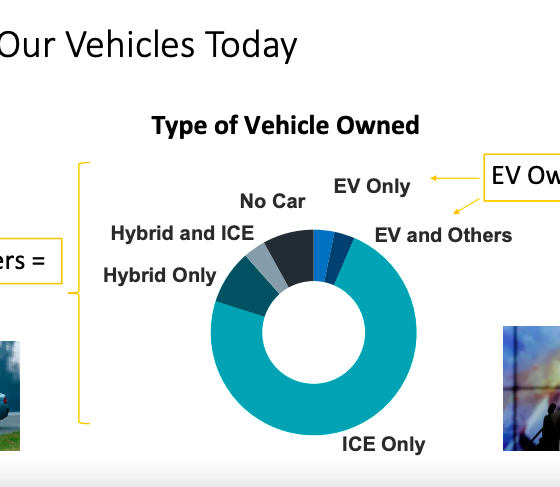A new study shows that only 26% of U.S. households are familiar with EVs but this is about to change. In the recent study by Parks Associates, it was noted that as Tesla became a household name, purchase intention for EVs has gone up 6%.
I wrote about this here, and Teslarati was invited to attend to the virtual session where Chris White, the senior analyst who conducted the study, led a virtual presentation.
According to the study,
“Only 26% of US broadband households report high familiarity with electric vehicles but that’s about to change. These sessions address the coming surge of EVs on the market, the potentially explosive EV growth in adoption, and the implications for consumers, the grid, and needed infrastructure.”
Electric Vehicles: A New Era for Consumers
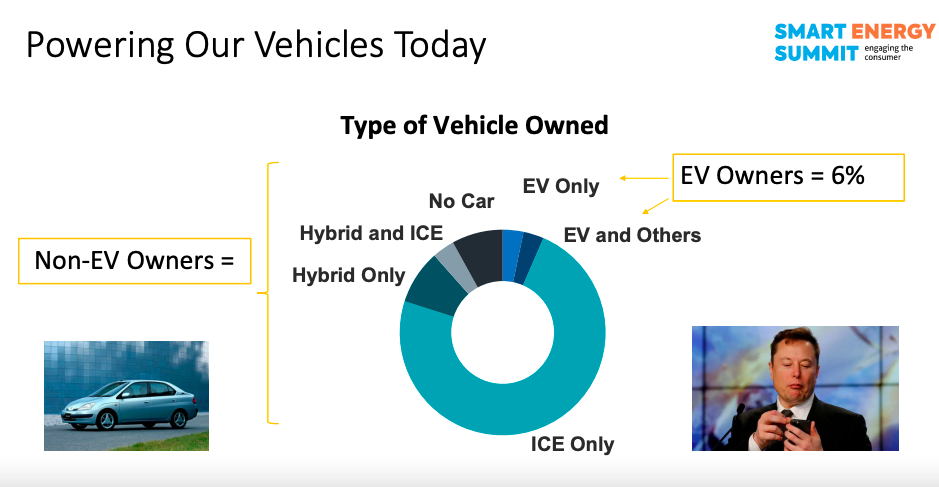
During the virtual session, Chris White explained some of the findings of the study. Some of these include current EV owner demographics, EV owner interest in clean energy, EV owners’ high-tech affinity, lack of knowledge of EV features, and how other issues such as the chip shortage are affecting both EV and non-EV markets.
The report was based on data from Q4 2021.
Understanding Current EV Owners
Current EV owners are young affluent and have dual incomes. Many are from a multifamily environment and use their EVs for work and school.
They use their vehicles regularly. It’s important to highlight since EVs have the image of a rare or exotic car that doesn’t have enough range. This is changing.
As the EV market continues to grow, the demographics of the current EV owners will most likely change. For now, there’s a 16% high intention of purchasing EVs among non-owners. Previous that was 10%.
That number didn’t include the current EV owners who either want to add a new EV or replace an old one.
EV Owners 3x likely to use renewable energy
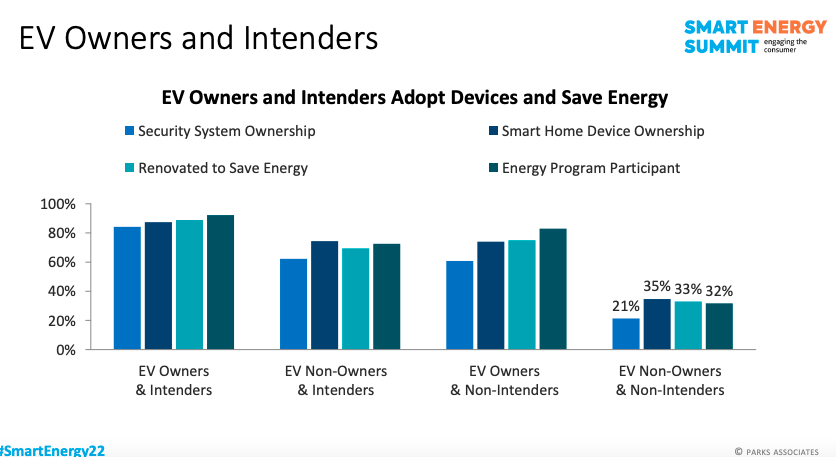
Chris White’s research showed that EV buyers are three times more likely to live in solar communities or have an interest in renewable energy powering their homes. They are also 2.5 to 5 times more willing to pay more for renewable energy.
The research shows that EV owners care about their carbon footprint and the impact on the environment.
EV owners are much more likely to own a security system or a smart home device than non-EV owners, according to the research
They xcare about technology and have a higher affinity for tech than non-EV owners.
Lack of familiarity with EV features.
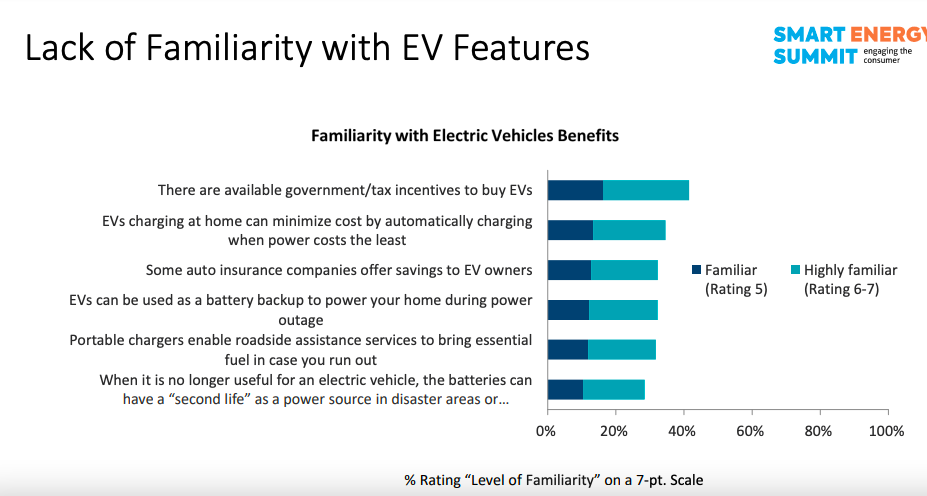
One of the key points in the study shows that although EVs are more popular today, there is a lack of familiarity with their features.
Chris pointed out that 18% of the consumers polled indicated familiarity with EV features. That isn’t a lot.
Features that many aren’t familiar with include EV charging at home minimizing cost when automatically charging during off-peak hours, auto insurance savings for EV owners, second-life EV batteries reused as a power source in disaster areas, and available tax incentives.
Second-life EV batteries are expected to reach over $34 billion by 2027 according to Research and Markets. You can read more about this here.
EV Features that could persuade non-owners to buy an EV
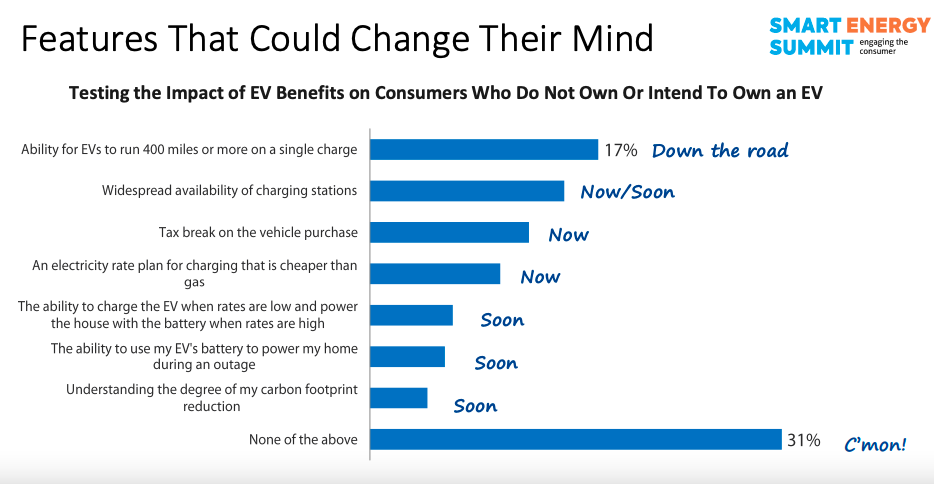
The study included the top features that could persuade non-EV owners to switch to electricity. The number one feature was for an EV to run 400 miles or longer on a single charge.
During the session, Chris pointed out that this is still rare and that most EVs are in the 200-300 mile range.
Other features included widespread charging stations and electricity plans that make owning an EV more affordable than owning an ICE vehicle. These are coming and soon people will see for themselves that EVs meet the criteria they are looking for.
Purchase Inhibitors.
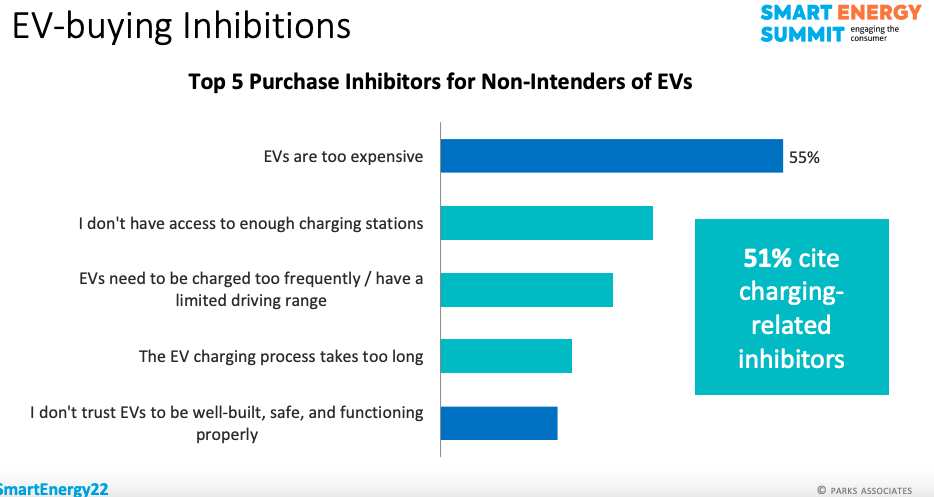
The number one purchase inhibitor that non-EV owners are concerned about are the cost of an EV and charging.
The research showed that 51% of the consumers who participated in the study cited charging-related issues.
Another issue was the lack of trust in the design of EVs,
Issues that impact both EV and non-EV purchases
We often see issues such as the semiconductor chip shortage and critical minerals for EV batteries impacting the EV market. However, something that impacts both markets includes the chip shortage, Putin invading Ukraine, and the national gas prices being on the rise.
The latter can create pain at the pump which is something that encourages people to make the switch to EVs. Last month, I wrote about Dobson who purchased a Tesla due to several factors but especially high gas prices.
EVs will be everywhere soon.
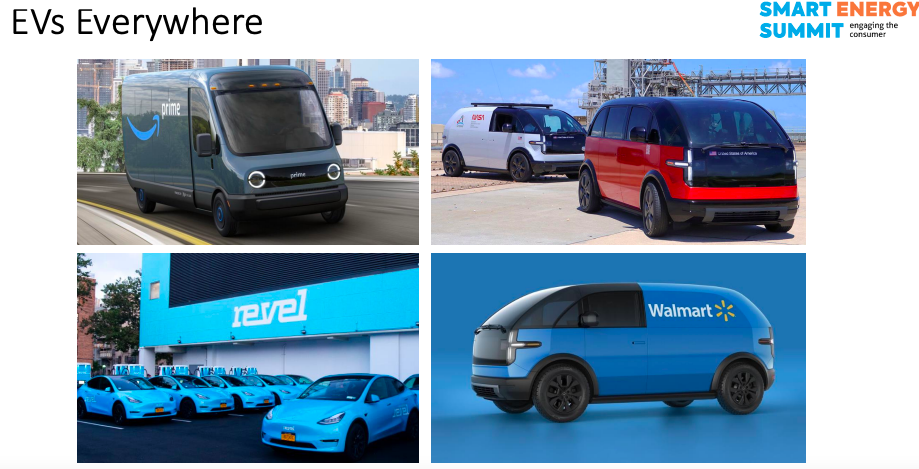
The research also revealed that soon, EVs will be everywhere.
Chris spoke about the Amazon and Rivian partnership, Walmart’s purchase of Canoo EVs, Revel’s fleet of Tesla taxis in New York, and the contract between NASA and Canoo.
And this is just on the commercial side. Other automakers are producing and marketing their own EVs to compete with Tesla.
Disclaimer: Johnna is long Tesla.
I’d love to hear from you! If you have any comments, concerns, or see a typo, you can email me at johnna@teslarati.com. You can also reach me on Twitter @JohnnaCrider1

News
Tesla ships out update that brings massive change to two big features
“This change only updates the name of certain features and text in your vehicle,” the company wrote in Release Notes for the update, “and does not change the way your features behave.”

Tesla has shipped out an update for its vehicles that was caused specifically by a California lawsuit that threatened the company’s ability to sell cars because of how it named its driver assistance suite.
Tesla shipped out Software Update 2026.2.9 starting last week; we received it already, and it only brings a few minor changes, mostly related to how things are referenced.
“This change only updates the name of certain features and text in your vehicle,” the company wrote in Release Notes for the update, “and does not change the way your features behave.”
The following changes came to Tesla vehicles in the update:
- Navigate on Autopilot has now been renamed to Navigate on Autosteer
- FSD Computer has been renamed to AI Computer
Tesla faced a 30-day sales suspension in California after the state’s Department of Motor Vehicles stated the company had to come into compliance regarding the marketing of its automated driving features.
The agency confirmed on February 18 that it had taken a “corrective action” to resolve the issue. That corrective action was renaming certain parts of its ADAS.
Tesla discontinued its standalone Autopilot offering in January and ramped up the marketing of Full Self-Driving Supervised. Tesla had said on X that the issue with naming “was a ‘consumer protection’ order about the use of the term ‘Autopilot’ in a case where not one single customer came forward to say there’s a problem.”
This was a “consumer protection” order about the use of the term “Autopilot” in a case where not one single customer came forward to say there’s a problem.
Sales in California will continue uninterrupted.
— Tesla North America (@tesla_na) December 17, 2025
It is now compliant with the wishes of the California DMV, and we’re all dealing with it now.
This was the first primary dispute over the terminology of Full Self-Driving, but it has undergone some scrutiny at the federal level, as some government officials have claimed the suite has “deceptive” names. Previous Transportation Secretary Pete Buttigieg was one of those federal-level employees who had an issue with the names “Autopilot” and “Full Self-Driving.”
Tesla sued the California DMV over the ruling last week.
News
Tesla workers push back against Giga Berlin unionization
“IG Metall did not succeed in Giga Berlin‘s works council election earlier today. The union share was reduced from nearly 40% in 2024 to 31% in 2026! This is a clear message by the Giga Berlin team towards an independent co-determination! The list called Giga United, led by the current chairwoman, Michaela Schmitz, received the most votes with more than 40%! Good news for Giga Berlin!”

Tesla workers pushed back against unionization efforts at Gigafactory Berlin, and over the past few years, there has been a dramatic decrease in interest to unionize at the German plant.
Gigafactory Berlin Plant Manager André Thierig announced on Wednesday that IG Metall, the European union group, saw its share reduce from 40 to 31 percent in 2026 as employees eligible to vote on the issue. Instead, the Giga Berlin team, known as Giga United, received the most votes with more than 40 percent.
BREAKING! 🚨
IG Metall did not succeed in Giga Berlin‘s works council election earlier today. The union share was reduced from nearly 40% in 2024 to 31% in 2026!
This is a clear message by theGiga Berlin team towards an independent co-determination!
The list called Giga…
— André Thierig (@AndrThie) March 4, 2026
Thierig gave specific details in a post on X:
“IG Metall did not succeed in Giga Berlin‘s works council election earlier today. The union share was reduced from nearly 40% in 2024 to 31% in 2026! This is a clear message by the Giga Berlin team towards an independent co-determination! The list called Giga United, led by the current chairwoman, Michaela Schmitz, received the most votes with more than 40%! Good news for Giga Berlin!”
There were over 10,700 total employees who were eligible to vote, with 87 percent of them turning out to cast what they wanted. There were three key outcomes: Giga United, IG Metall, and other notable groups, with the most popular being the Polish Initiative.
The 37-seat council remains dominated by non-unionized representatives, preserving Giga Berlin as Germany’s only major auto plant without a collective bargaining agreement.
Thierig and Tesla framed the outcome as employee support for an “independent, flexible, and unbureaucratic” future, enabling acceleration on projects like potential expansions or new models. IG Metall expressed disappointment, accusing management of intimidation tactics and an “unfair” campaign.
The first election of this nature happened back in 2022. In 2024, IG Metall emerged as the largest single faction with 39.4 percent, but non-union lists coalesced for a majority.
But this year was different. There was some extra tension at Giga Berlin this year, as just two weeks ago, an IG Metall rep was accused by Tesla of secretly recording a council meeting. The group countersued for defamation.
Tesla Giga Berlin plant manager faces defamation probe after IG Metall union complaint
This result from the 2026 vote reinforced Tesla’s model of direct employee-management alignment over traditional German union structures, amid ongoing debates about working conditions. IG Metall views it as a setback but continues advocacy. Tesla sees it as validation of its approach in a competitive EV market.
This outcome may influence future labor dynamics at Giga Berlin, including any revival of expansion plans or product lines, which Musk has talked about recently.
News
SpaceX President Gwynne Shotwell details xAI power pledge at White House event
The commitment was announced during an event with United States President Donald Trump.

SpaceX President Gwynne Shotwell stated that xAI will develop 1.2 gigawatts of power at its Memphis-area AI supercomputer site as part of the White House’s new “Ratepayer Protection Pledge.”
The commitment was announced during an event with United States President Donald Trump.
During the White House event, Shotwell stated that xAI’s AI data center near Memphis would include a major energy installation designed to support the facility’s power needs.
“As you know, xAI builds huge supercomputers and data centers and we build them fast. Currently, we’re building one on the Tennessee-Mississippi state line. As part of today’s commitment, we will take extensive additional steps to continue to reduce the costs of electricity for our neighbors…
“xAI will therefore commit to develop 1.2 GW of power as our supercomputer’s primary power source. That will be for every additional data center as well. We will expand what is already the largest global Megapack power installation in the world,” Shotwell said.
She added that the system would provide significant backup power capacity.
“The installation will provide enough backup power to power the city of Memphis, and more than sufficient energy to power the town of Southaven, Mississippi where the data center resides. We will build new substations and invest in electrical infrastructure to provide stability to the area’s grid.”
Shotwell also noted that xAI will be supporting the area’s water supply as well.
“We haven’t talked about it yet, but this is actually quite important. We will build state-of-the-art water recycling plants that will protect approximately 4.7 billion gallons of water from the Memphis aquifer each year. And we will employ thousands of American workers from around the city of Memphis on both sides of the TN-MS border,” she noted.
The Ratepayer Protection Pledge was introduced as part of the federal government’s effort to address concerns about rising electricity costs tied to large AI data centers, as noted in an Insider report. Under the agreement, companies developing major AI infrastructure projects committed to covering their own power generation needs and avoiding additional costs for local ratepayers.
